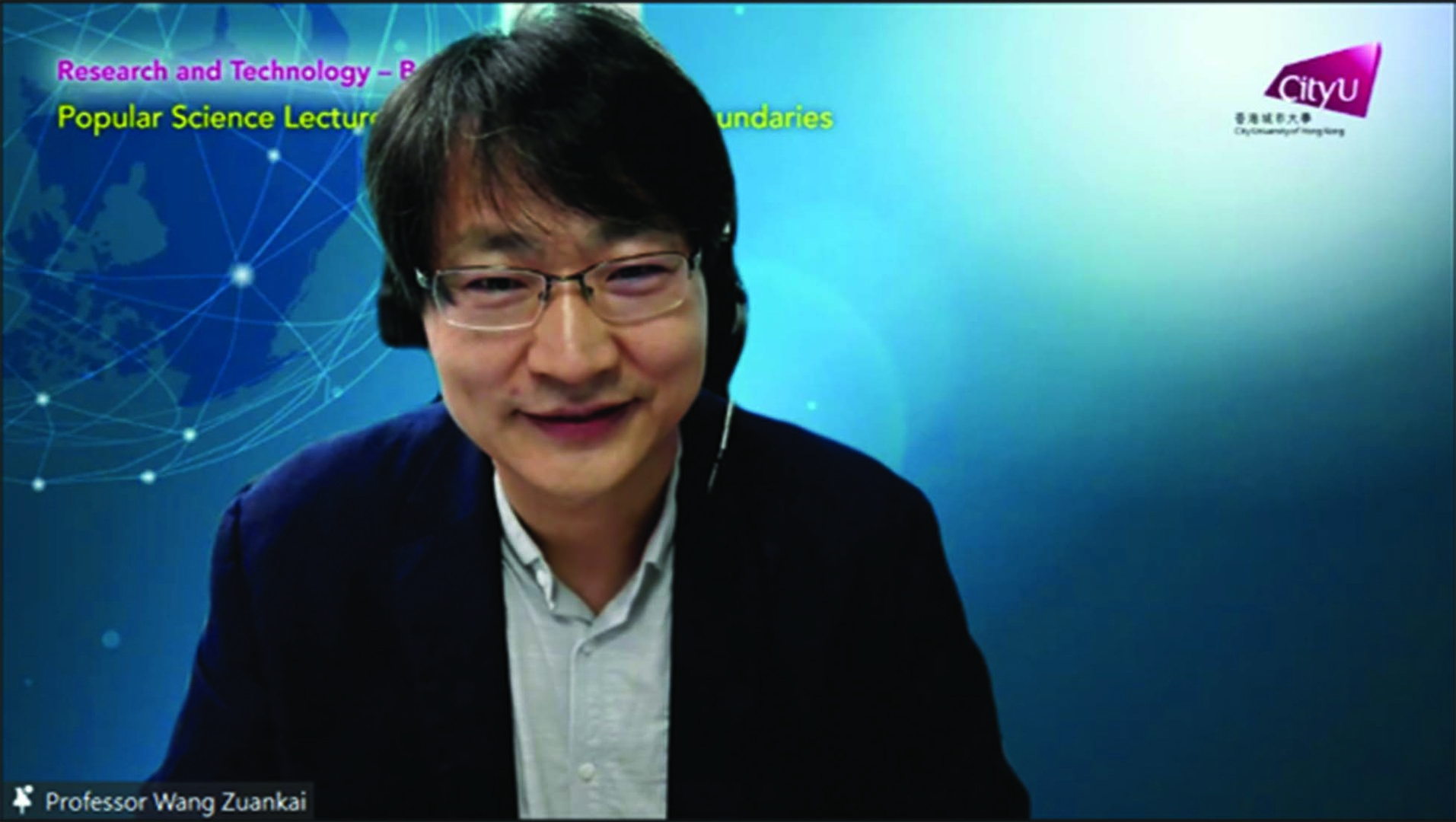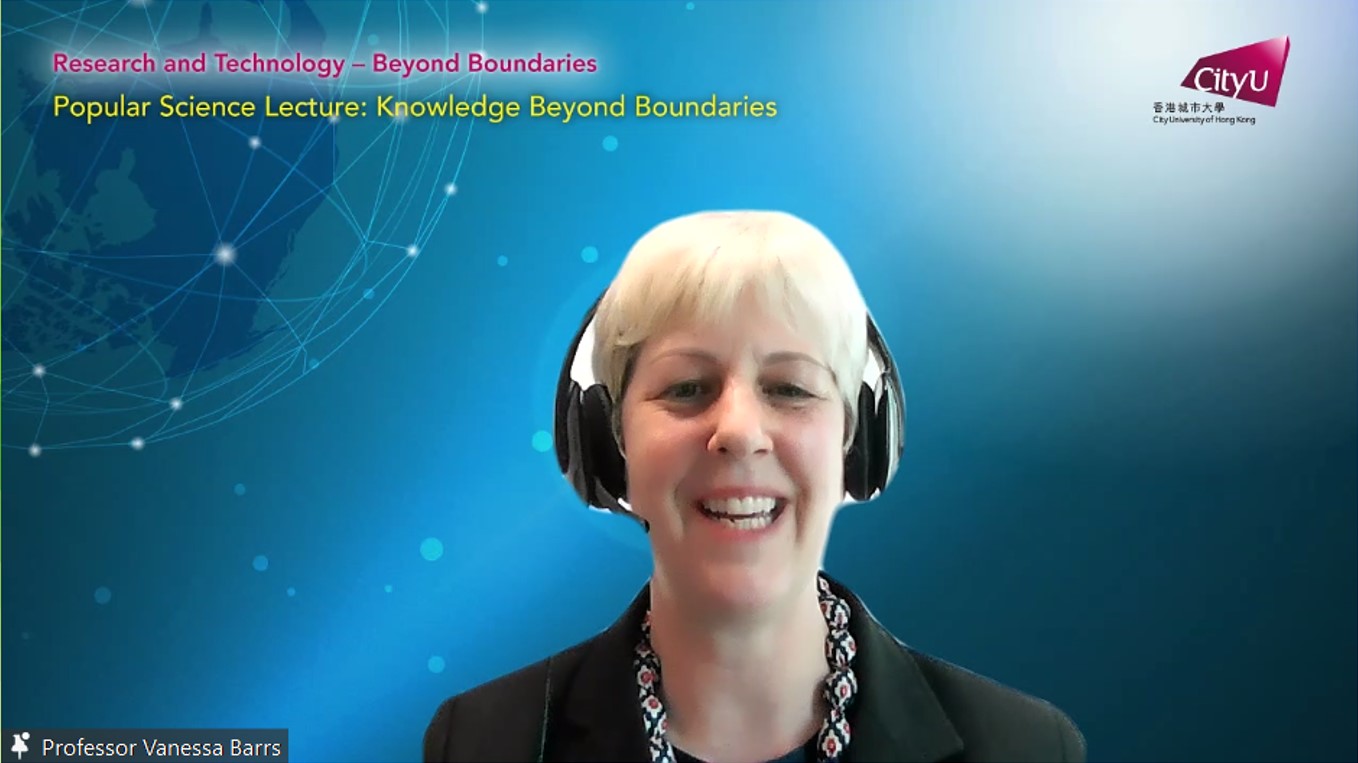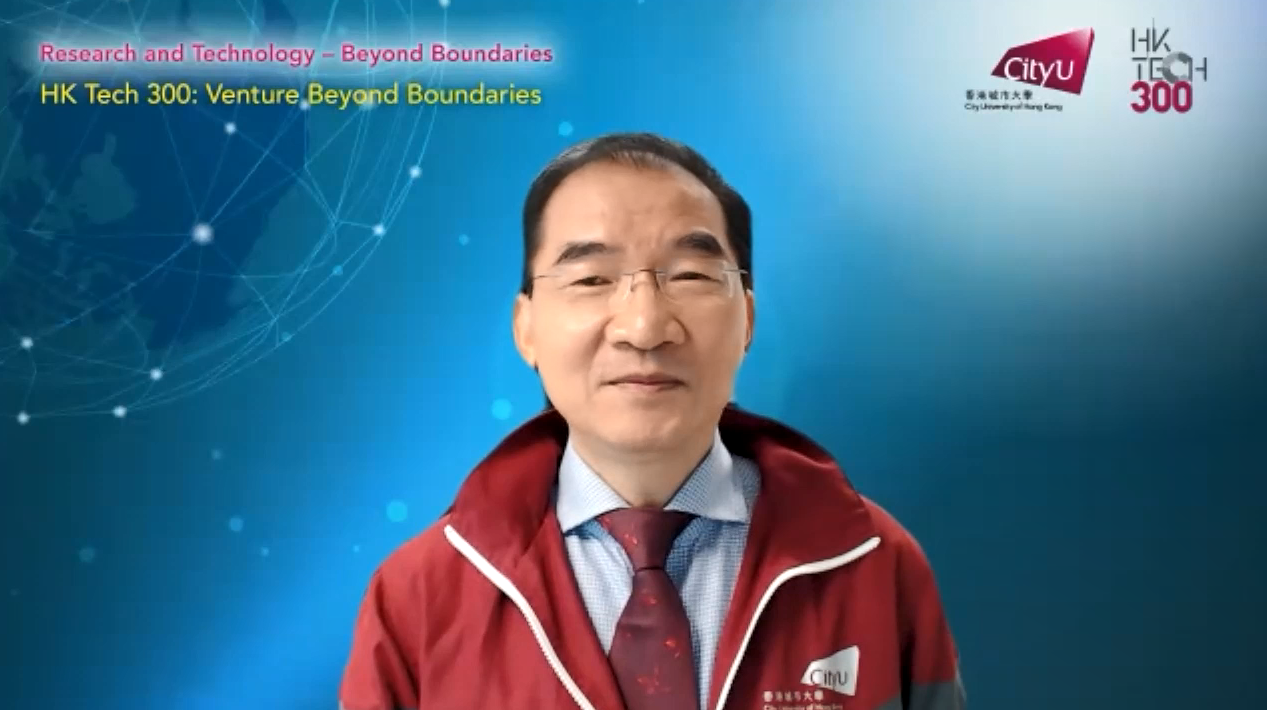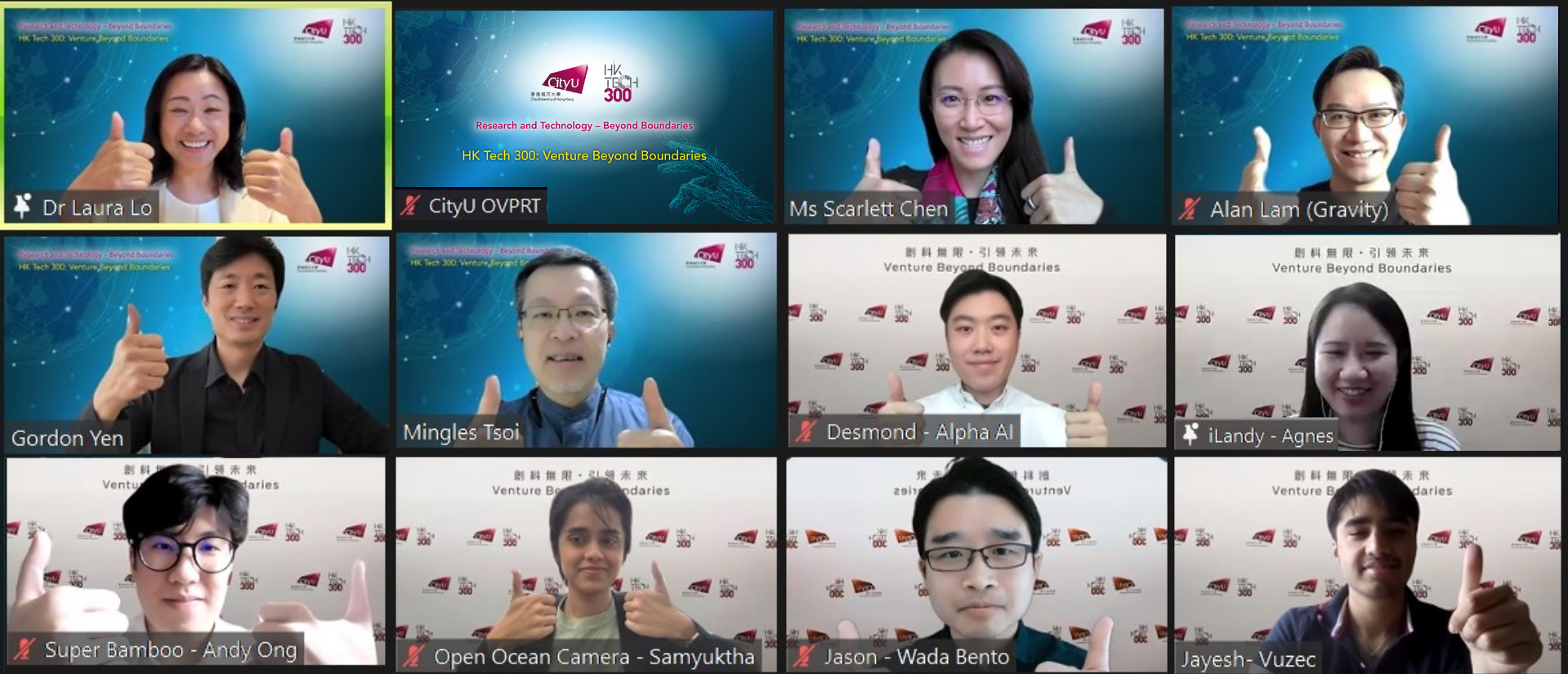Celebrating “University Day” with Popular Science Lecture and HK Tech 300 Start-up Pitching Event
To celebrate “University Day 2022” of City University of Hong Kong (CityU), the Office of the Vice-President (Research and Technology) presented two engaging and exciting online events related to research, innovation and entrepreneurship, under the theme “Research and Technology – Beyond Boundaries” on 17 March. Participating online were hundreds of students, alumni and staff, representatives from government departments and related organisations, students and researchers from other universities in Hong Kong, mainland China and overseas, start-ups, venture capitalists, and representatives from the industrial and commercial sectors, as well as people from all walks of life.
Under the theme “Research and Technology – Beyond Boundaries”, the morning event was a Popular Science Lecture, with distinguished researchers as speakers. The afternoon event featured young entrepreneurs from HK Tech 300. They pitched to seasoned venture capitalists and answered questions from both the venture capitalists and the online audience. “Super Bamboo” was voted “My Favourite HK Tech 300 start-up” by the audience.
Popular Science Lectures: Knowledge Beyond Boundaries
Under the theme “Knowledge Beyond Boundaries”, the Popular Science Lecture was delivered in the morning session, moderated by Professor Michael Tse Chi-kong, CityU’s Associate Vice-President (Strategic Research). Four outstanding researchers unfolded some of their latest scientific discoveries and technological innovations in an interesting and easy-to-understanding way, and shared how cutting-edge research addressed some of today’s most pressing issues.

Professor Wang Zuankai, Associate Dean (Internationalization & Industry Engagement) in the College of Engineering and Chair Professor in the Department of Mechanical Engineering at CityU, was the first speaker. He used cooking to introduce the concepts of transfer and the “Leidenfrost effect”, which makes liquid cooling on a hot surface ineffective.
He explained that his research team designed a multi-textured structured thermal armour (STA) that achieved efficient liquid cooling even over 1,150°C. “This is 600°C higher than the previous record,” he said. “And 1,150°C is actually the melting point of the materials we used, so if we use materials with a melting point of 3000°C, then the applicable efficient liquid cooling temperature can be increased to 3000°C.” The findings were published in the highly prestigious scientific journal Nature.
In the Q&A session, an audience member asked about the cost of STA. Professor Wang pointed out that owing to the simple design and common materials used, the cost is not high. He added that safety and reliability will likely matter more than cost if the STA is used in real applications.

Dr Yu Xinge, Associate Professor in the Department of Biomedical Engineering, first talked about the metaverse and the technology bottleneck for existing virtual reality (VR) devices. He then introduced the research study on the Robotic VR human-machine interface system that he co-led. The system consists of flexible, wearable, multi-layered electronic skin, and provides both visual and haptic feedback to users.
The system can tele-operate a robot to imitate the user’s actions to perform tasks. “It demonstrates the potential of remotely controlling a robotic hand to collect throat swab samples for Covid-19 tests, and to tele-operate humanoid robots to take care of patients with infectious diseases,” explained Dr Yu.
In his response to a question from the audience, Dr Yu said he believed that the technology could be applied in textiles and Industry 4.0.

Hong Kong is currently being affected by the 5th wave of COVID-19. The talks by the other two speakers were both about the pandemic.
Professor Vanessa Barrs, Associate Dean of the Jockey Club College of Veterinary Medicine and Life Sciences, Director of Veterinary Affairs, and Chair Professor of the Department of Veterinary Clinical Sciences, talked about animal-human transmission of COVID-19.
She stressed that the risk of pet owners contracting COVID-19 from pets at home is negligible. And according to a research study about stray cats that her team led, no stray cats in Hong Kong were found to be shedding the virus or to have been exposed to the virus.
She pointed out that animal-to-human infections have occurred on only a few occasions when large numbers of susceptible animals, such as mink and hamsters, were housed together in environments conducive to spreading the virus.
To prevent future pandemics, she said it was important to limit opportunities for close contact between wild animals and humans, for example by stopping wild animal trading in wet markets, preventing illegal animal trading, and conducting infectious disease surveillance of imported animals.
An audience member asked how pet owners should treat their pets at home. Professor Barrs suggested pet owners should practise normal hygiene measures when handling their pets, including not kissing them, and washing their hands before and after touching them.

Dr Sean Yuan Hsiang-yu, Assistant Professor in the Department of Biomedical Sciences, introduced “Mathematical Modelling and Applications in COVID-19”. He raised an issue that most of us are interested in: to lock down or not to lock down. He explained that mathematical modelling might provide an answer.
He pointed out that a mathematical model can predict the number of infections, estimate the effect of interventions, and project the outcomes under different scenarios. However, the accuracy of modelling may be affected by at least two factors: human behaviour can change during an outbreak, and human antibody levels can change too. His research team predicted the fifth wave of COVID-19 in Hong Kong, and estimated the effectiveness of mass testing implemented at various stages of the wave.
An audience member asked if there would be a sixth or even seventh wave. “Unless the whole world can end the pandemic at the same time and eradicate the virus, I believe there will be a wave once a year or even every few months, just like influenza,” said Dr Yuan frankly.
HK Tech 300: Venture Beyond Boundaries
Like the popular overseas TV show “Shark Tank”, the afternoon online event gave the audience a chance to witness how HK Tech 300 young entrepreneurs skilfully convinced a panel of seasoned investors to support their ideas.

In his welcome address, Professor Michael Yang Mengsu, CityU’s Vice-President (Research and Technology), introduced HK Tech 300, a large flagship innovation and entrepreneurship programme that CityU launched a year ago. The programme supports CityU community members and other young people in Hong Kong to transform their ideas into start-ups. CityU has also joined hands with important stakeholders, such as companies and individuals in the industrial and business sectors, to build an entrepreneurship ecosystem.
“So far we have awarded over 200 project teams with seed funding of HK$100,000 each, and over 30 start-ups have been awarded HK$1 million from Angel Fund investment,” said Professor Yang. “Securing funding is one of the most crucial factors for entrepreneurial success. And what’s better than learning from real-world investors? So we invited several experienced angel investors and venture capitalists to be our panellists today to listen to our teams pitch their products and services. It is also a good chance for our teams to accumulate experience in pitching to investors.”

Dr Laura Lo, Associate Vice-President (Chinese Mainland Affairs Office) and Chairman of the HK Tech 300 Incubation Sub-Committee, was the moderator of the pitching session. The seasoned investors who formed the panel were as follows:
- Dr Alan Lam, Director and CTO, Gravity Capital Partners Company Limited
- Dr Samson Tam, Founder of “Instant-Dict” and Partner of the Hong Kong Inno Angel Fund
- Dr Gordon Yen, Chairman of the Hong Kong Business Angel Network
- Mr Mingles Tsoi, Executive Committee member of the Hong Kong Startup Council, Federation of Hong Kong Industries; and CXO of ParticleX
- Ms Scarlett Chen, Managing Director, Ecosystems, Prudential Corporation Asia
This start-up pitching event brought together six HK Tech 300 start-up teams. Representing Alpha AI, Mr Desmond Ho introduced the company’s goal of revolutionising the car insurance claims process by empowering drivers to inspect car damage with an AI-powered mobile application. After the accident, drivers only need to upload photos showing the car damage to the app. Then they will receive a quotation from the car repair company, skipping the processes of filling in claim forms and manual inspection.
Ms Tsang Wai-man, representing iLandy and an alumna of CityU’s Department of Accountancy, College of Business, introduced their blockchain-powered leasing and property-management platform, which offers account consolidation, smart contracts, and an assets tokenisation exchange and clearing system through a trustworthy, verified network. Their goal is to provide a one-stop service for both tenants and landlords.
Representing Kamakura Foods Limited, Mr Chen Jun, Jason, a CityU MBA alumnus, introduced their decentralised food service concept: providing hot and fresh meals to customers with their patented Bento Machine. The Bento Machines are already in service at Cyberport, the HKSTP and other places. The company was named in the Forbes Asia 100 To Watch in 2021.
Representing Open Ocean Camera, Ms Samyuktha Sriram Dharmapadam, an alumna from CityU’s Department of Marketing, College of Business, introduced their solution for marine ecosystem monitoring, which has already been put into practice to modernise the traditional fish farming industry in mainland China. Fish farmers install cameras and sensor units in their tanks, connect them to the system, and then receive suggestions from the system based on the real situation regarding how to increase fish yield and reduce feed waste.
Mr Andy Ong, representing Super Bamboo, and an undergraduate in the Department of Mechanical Engineering, introduced the CityU-developed “Super Bamboo”, an advanced augmented bamboo-based material, which is stronger than steel and does not emit formaldehyde. The aim of the product is to facilitate carbon neutrality and sustainability. The related technology won the Gold Medal at Inventions Geneva Evaluation Days (IGED) 2021.
Mr Jayesh Chhatlani, representing Vuzec, and an undergraduate in the Department of Mechanical Engineering, described Vuzec as a platform that leverages NFT (non-fungible token) blockchain technology to allow recording artists and musicians to collect payments and royalties directly for their work, while keeping distribution and creative direction in their hands, and maintaining the artist–fan relationship.
The start-up representatives answered the panellists’ questions regarding their business models and target customers and interacted with the online audience in the open Q&A session. The climax of the event was a poll titled “My Favourite HK Tech 300 Start-up Team” among the online audience. The winner was Super Bamboo. Andy said he felt honoured to win the audience’s support and hoped that their product would contribute to a greener future.
Closing the event, Dr Lo thanked all the panellists, HK Tech 300 teams and audience members for joining the programme. She said she hoped that the other start-up teams gained some insights for sharpening their pitching skills.